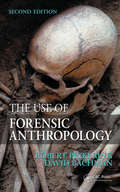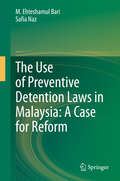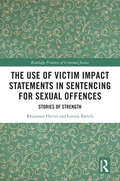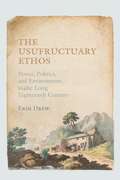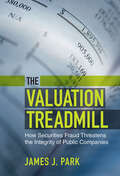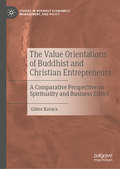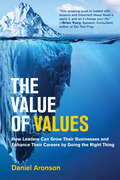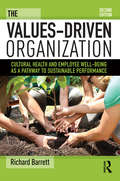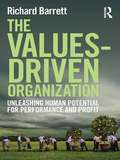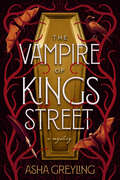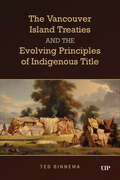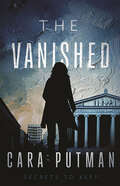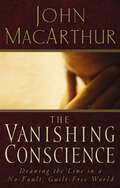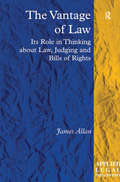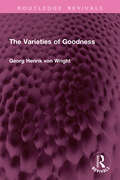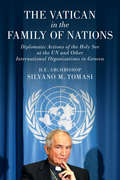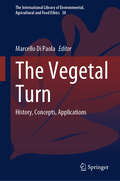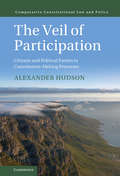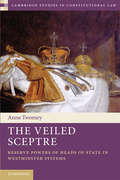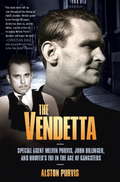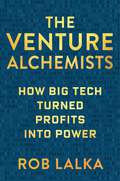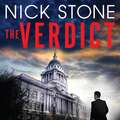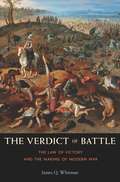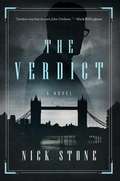- Table View
- List View
The Use of Forensic Anthropology
by Robert B. Pickering David BachmanA forensic investigation requires a team of specialists from many different scientific fields of study along with legal and law enforcement specialists. In recent years, the range of cases on which forensic anthropologists have been consulted has expanded dramatically. The Use of Forensic Anthropology provides these professionals with guidelines fo
The Use of Preventive Detention Laws in Malaysia: A Case for Reform
by M. Ehteshamul Bari Safia NazThis book examines the extraordinary nature of the power of preventive detention, which permits executive dispensation of the personal liberty of an individual on the mere apprehension that, if free and unfettered, he may commit acts prejudicial to national security or public order. In light of the extraordinary scope of this power, it, therefore, contends that the scope of the power should be confined to genuine emergencies threatening the life of the nation. Against the above background, this book sheds light on the fact that Article 149 of the Federal Constitution of Malaysia empowers the Parliament to enact preventive detention laws authorizing the executive branch of government to preventively detain individuals without the precondition of an emergency. Furthermore, the Constitution does not stipulate adequate safeguards for mitigating the harshness of preventive detention laws. This book makes it manifestly evident that the weaknesses of the constitutional provisions concerning preventive detention have enabled succeeding generations of executives in Malaysia to not only enact a series of preventive detention statues for arrogating to themselves wide powers concerning preventive detention but also to rely on them for arbitrarily detaining their political adversaries. Consequently, on the basis of this analysis, this book puts forward concrete recommendations for insertion in the Constitution detailed norms providing for legal limits on the wide power of the executive concerning preventive detention. The insertion of such norms would ensure the maintenance of a delicate balance between protecting national interests and, simultaneously, observing respect for an individual’s right to protection from arbitrary deprivation of liberty.This book is useful for academics and students of comparative constitutional law, human rights and Asian law. The extensive law reform analysis undertaken in this book also greatly benefits the policy makers in Malaysia and the policy makers of constitutional polities facing similar problems with the issue of circumscribing the scope of the powers concerning preventive detention.
The Use of Victim Impact Statements in Sentencing for Sexual Offences: Stories of Strength (Routledge Frontiers of Criminal Justice)
by Rhiannon Davies Lorana BartelsDrawing on extensive research from Australia, this book examines the experiences of sexual offence victims who submit a victim impact statement. Victim impact statements are used in sentencing to outline the harm caused to victims. There has been little research on the impact statement experiences of sexual offence victims. This book fills this gap, examining the perspectives of six adult female victims and 15 justice professionals in Australia. This is supplemented by analysis of 100 sentencing remarks, revealing how courts use such statements in practice. This book examines victims’ experiences of preparing and submitting statements, justice professionals’ experiences of working with victims to submit statements, and the judicial use of impact statements in sentencing. It identifies an overarching lack of clarity around the purpose of impact statements, which affects the information that can be included and the way they can be used by the court. It consequently explore issues associated with balancing the expressive and instrumental purposes of such statements, and the challenges in communication between professionals and victims of crime. The findings highlight several issues with the operation of impact statement regimes. Based on these findings, the book makes recommendations to clarify such regimes, to improve communication between justice professionals and victims of crime, and to enhance the therapeutic goals of such statements. An accessible and compelling read, this book is essential reading for all those engaged with victimology, sentencing, and sexual violence.
The Usufructuary Ethos: Power, Politics, and Environment in the Long Eighteenth Century
by Erin DrewAlthough a study of past ideas, The Usufructuary Ethos resonates with contemporary debates about our human responsibilities to the natural world in the face of climate change and mass extinction.
The Valuation Treadmill: How Securities Fraud Threatens the Integrity of Public Companies
by James J. ParkPublic companies now face constant pressure to meet investor expectations. A company must continually deliver strong short-term performance every quarter to maintain its stock price. This valuation treadmill creates incentives for corporations to deceive investors. Published more than twenty years after the passage of Sarbanes-Oxley, which requires all public companies to invest in measures to ensure the accuracy of their disclosures, The Valuation Treadmill shows how securities fraud became a major regulatory concern. Drawing on case studies of paradigmatic securities enforcement actions involving Xerox, Penn Central, Apple, Enron, Citigroup, and General Electric, the book argues that corporate securities fraud emerged as investors increasingly valued companies based on their future performance. Corporations now have an incentive to issue unrealistically optimistic disclosure to convince markets that their success will continue. Securities regulation must do more to protect the integrity of public companies from the pressure of the valuation treadmill.
The Value Orientations of Buddhist and Christian Entrepreneurs: A Comparative Perspective on Spirituality and Business Ethics (Studies in Buddhist Economics, Management, and Policy)
by Gábor KovácsThis book is a comparative analysis of the value orientations of Buddhist and Christian entrepreneurs and how these values impact business. The chapters review and analyze the concepts of Buddhist economics and the social teaching of the Roman Catholic Church. The value orientations of Buddhist and Christian entrepreneurs are described by irreducible core values that correspond to the ontological conception, the procedural dimension, and the “other directedness” of a spiritual value commitment in business. The book includes the reflections of Buddhist and Christian entrepreneurs about business spirituality, profit, the temporal perspectives of business, and stakeholder management. The cases testify that a spiritual value orientation can contribute to creating genuine ethical commitment. The findings and the examples can encourage business scholars and practitioners to stop considering ethics as an instrument in the service of profit and serve as inspiration for integrating spirituality into business in a profound way. This book will be of interest to scholars studying business ethics, workplace spirituality and faith at work.
The Value of Values: How Leaders Can Grow Their Businesses and Enhance Their Careers by Doing the Right Thing (Management on the Cutting Edge)
by Daniel AronsonHow business leaders can grow profits and competitive advantage by doing the right thing.Acting on values—doing good for the benefit of all—can substantially benefit the bottom line, but many business leaders mistakenly believe that doing the right thing lowers profits. This belief is the greatest barrier holding businesses back from being more financially and competitively successful—and delivering more good for the world. Not only can it be a winning business strategy to act on values, as Daniel Aronson suggests in The Value of Values, but it is also a savvy choice, increasing a company&’s power, profit, and competitive advantage—in many cases with little additional investment or risk.It starts with seeing what others miss. Using extensive research and real-world calculations, Aronson demonstrates that the &“submerged value&” of initiatives such as taking bold action to combat climate change, helping people find jobs, or creating an open, inclusive work environment is normally 4 to 10 times more than initially believed. Calculating and capturing the true business benefit of acting on values provides a much-needed update to the sustainability and responsibility playbook. Even more important, it shows executives how to harness the value of values to improve profitability, acquire customers, and turbocharge their own careers.Written by a measurement pioneer and one of the world&’s foremost experts on making ethical business count, The Value of Values trains leaders to respond smartly and credibly to today&’s challenges, transforming how business can and should be done.
The Values-Driven Organization: Cultural Health and Employee Well-Being as a Pathway to Sustainable Performance
by Richard BarrettValues-driven organizations are the most successful organizations on the planet. This book explains that understanding employees’ needs—what people value—is the key to creating a high performing organization. When you support employees in satisfying their needs, they respond with high levels of engagement and willingly commit their energies to the organization, bringing passion and creativity to their work. This new edition of The Values-Driven Organization provides an updated set of tools to assess corporate culture, new case studies on cultural transformation and additional materials on sustainability, measuring cultural health at work and the specific needs of the millennial generation. The Values-Driven Organization is essential reading for students, researchers and practitioners of organizational change, leadership, HRM and business ethics.
The Values-Driven Organization: Unleashing Human Potential for Performance and Profit
by Richard BarrettBased on significant new research from multiple sources, Richard Barrett creates a compelling narrative about why values-driven organizations are the most successful organizations on the planet. According to Barrett, understanding employee's needs--what people value--is the key to creating a high performing organization. When you support employees in satisfying their needs, they respond with high levels of employee engagement and willingly bring their commitment and creativity to their work. This book updates and brings together in one volume, two of Richard Barrett's previous publications, Liberating the Corporate Soul (1998) and Building a Values-Driven Organisation (2006), to provide a reference manual for leaders and change agents who wish to create a values-driven organization. The text provides both a leadership approach, and a language, for organizational transformation and culture change that incorporates concepts such as cultural entropy, values alignment and whole system change. With an updated set of cultural diagnostic tools and a wide range of new and exciting case studies on culture and leadership development, The Values-Driven Organization will be essential reading for students, researchers and practitioners in the fields of organizational change, leadership and ethics.
The Vampire of Kings Street: A Mystery
by Asha GreylingIn this gothic debut novel, perfect for fans of Tread of Angels and Gail Carriger&’s Soulless, Miss Radhika Dhingra, a newly minted lawyer in 19th century New York, never expected that her first client would be a vampire accused of murder. Having a resident vampire is just the thing for upper-class New Yorkers–besides being a status symbol, they make excellent butlers or housekeepers. The only thing they require in return is a drop or two of blood and a casket to shut out the dawn&’s early light. Tolerated by society only if they follow a strict set of rules, vampires are seen as &“less than&”–and as the daughter of immigrants, Radhika knows firsthand how this feels. Accused of murder, her undead client Mr. Evelyn More, knows that the cards are stacked against him.With the help of a journalist friend and a diminutive detective inspector, Miss Dhingra sets out to prove her client&’s innocence and win his freedom. Failure will mean Mr. More&’s death, the end of her dreams of becoming a successful attorney, and the loss of the vampire Miss Dhingra has begun to call her friend.Offering an alternative paranormal history, delightful characters, and insightful social commentary, The Vampire of Kings Street will thrill readers of Deanna Rayburn and Rebecca Roanhorse.
The Vancouver Island Treaties and the Evolving Principles of Indigenous Title
by Ted BinnemaThe Vancouver Island Treaties and the Evolving Principles of Indigenous Title illuminates the history of the enigmatic Vancouver Island treaties of the 1850s, offering new interpretations based on a fresh, exhaustive, and multidisciplinary critical analysis of relevant evidence. To understand as fully as possible the motivations, intentions, and understandings of the Indigenous and non-Indigenous signatories to the treaties, Ted Binnema places the treaties within the context of thousands of years of Vancouver Island history and hundreds of years of land-purchase agreements involving Indigenous peoples. The book explores the evolving concepts and principles of Indigenous title from the first Dutch and English treaties with Indigenous North Americans in the 1620s to the increasingly detailed articulations fuelled by debates and crises in Australia and New Zealand in the 1830s and 1840s. Binnema explains that Indigenous people themselves played important roles in the formation and elaboration of the principles of Indigenous title in the British World. Drawing on previously neglected archival documents and multidisciplinary evidence in linguistics, archaeology, anthropology, fisheries biology and biological sciences, and oral historiography, the book provides a new model for the study of the idea of Indigenous title and Indigenous land-purchase treaties worldwide.
The Vanished: A Novel
by Cara Putman"Putman's legal expertise shines in this compelling and intricately plotted romantic suspense. Highly recommended!" --Colleen Coble, USA Today best-selling author Janae Simmons left the small town of Kedgewick, Virginia, ten years ago to pursue her legal career and never looked back--until a professional mistake leads her to her grandmother's historic carriage house and to the town where her past threatens to find her. The quiet streets echo with her grandfather's sterling reputation, one that conflicts with fresh questions that claw at Janae, launching her on a reluctant journey to unearth his secrets. When her new job at a local law firm doesn't live up to expectations, she wonders if coming home was the right decision. Carter Montgomery starts his art preservation career with the only job he can get--director at the Elliott Museum of Art. At least Kedgewick is a nice enough town to provide him and his nephew with a safe place to grieve the loss of Carter's sister. But Carter's calm days disappear when an elderly woman claims two paintings in the museum's collection were stolen from her family during World War II. Carter enlists Janae's help to unravel the legal labyrinth of art ownership, and the peaceful facade of Kedgewick morphs into a hot bed of secrets. When an attorney turns up dead and Janae uncovers another painting, what began as a simple legal issue spirals into a race against time. As the web of intrigue tightens, the duo must confront a looming question: What dark truths lie beneath the surface, waiting to be exposed? "Cara Putman has once again created an exciting cast of characters. I was immediately drawn in by Janae and Carter's unique chemistry. This is one story you don't want to miss." --Rebecca Hemlock, award-winning author of Fury in the Shadows
The Vanishing Conscience
by John MacarthurAre you losing your ability to recognize sin? Are you becoming a person who finds it easy to shift blame, deny guilt, or excuse moral failure in yourself or others?In this challenging yet compelling book, John MacArthur encourages you to confront the culture's flight from moral responsibility. With sound biblical truth, this book shows how and why sin must be dealt with if you are to live in a way that pleases God. With clairty and insight, John MacArthur provides you with solutions for attaining a personal holiness that can take you from living a life of blame and denial to one of peace and freedom.Praise for The Vanishing Conscience:". . . a wake-up call and an alarm to jolt the sleeping church. Not all will like it, but all should read it. In this day of morality by majority, self-centered ministry, and twilight-zone theology, a clear word like this is long overdue." -Dr. Adrian Rogers, Pastor, Bellevue Baptist Church". . . a clear and prophetic word that we must hear and heed." -Dr. Joseph M. Stowell, President, Moody Bible Institute"With the clarion call of a prophet, MacArthur points us back to something we have forgotten: the value and importance of a clean conscience." -Greg Laurie, Senior Pastor, Harvest Christian Fellowship
The Vantage of Law: Its Role in Thinking about Law, Judging and Bills of Rights (Applied Legal Philosophy)
by James AllanThe premise of this book is that a shift of vantage will help elucidate various important issues of law related to judging, to bills of rights and to more abstract questions of legal philosophy. The work begins by focussing on the jurisprudential issue of whether it is desirable to keep separate the demands of law and of morality and uses the device of changing vantages to elucidate the many issues that fall under that aegis. This is followed by a consideration of how judges ought to do their job when interpreting and whether the rule of law ideal differs from rule by judges. The last part of the book focuses explicitly on bills of rights. Building on the earlier parts, the author uses his device of shifting vantages to provide insights into how these instruments affect democratic decision-making and from which perspectives they will look attractive and unattractive. Written in a clear, accessible and engaging style, the book demonstrates that vantage point is a key criterion affecting how one understands and evaluates, firstly, some of the theoretical debates in jurisprudence and then, secondly, what judges are doing and whether a bill of rights is desirable or not.
The Varieties of Goodness (Routledge Revivals)
by Georg Henrik von WrightFirst published in 1963, Varieties of Goodness presents analysis of the concept of value and its relations with the neighbouring concepts of fact and norm. The author discusses important themes such as instrumental and technical goodness; utilitarian goodness; goodness of faculties; active and passive pleasure; ethical hedonism; ideals of happiness; divisions of the virtues; connection between values and norms; concept of duty; and justice. This is a must read for scholars and researchers of philosophy.
The Vatican in the Family of Nations: Diplomatic Actions of the Holy See at the UN and other International Organizations in Geneva
by Robert J. Ghanem Antoine Abi Vincenzo Buonomo Richard Gyhra Marenghi Carlo Maria Stefano Saldi Tomasi Silvano M. Vitillo Silvano M. VitilloBased on a collection of statements delivered between 2003 and 2015, The Vatican in the Family of Nations provides a new understanding of the social doctrine and actions of the Catholic Church in international law and relations. These statements address contemporary issues that stir deep emotional responses, from disarmament, migrations, trade, and intellectual property to discrimination and freedom of conscience. This volume disputes irrational fears of newcomers, offers reasonable adaptations to allow for peaceful coexistence, and insists on investigating the root causes of today's conflicts and displacements. As an independent voice, the Holy See offers these reflections with the view of prioritizing the common good before confessional interests, even when their aims and ends converge. In this sense, this book is a unique collection in international literature on the intersection of theology, human rights and social issues, which opens courageous new paths for the future.
The Vegetal Turn: History, Concepts, Applications (The International Library of Environmental, Agricultural and Food Ethics #38)
by Marcello Di PaolaThis book charts the multidimensional course of what has come to be known as the “Vegetal Turn” in environmental humanities - a wave of theoretical and practical interest in the complexities and peculiarities of plant life and plant-human relations. The vegetal turn consists of increasingly sophisticated, inter- and trans-disciplinary, inter- and trans-cultural explorations of the multiple systems and networks of communication, intelligence, technical-operational capabilities, and relations articulated by and via plants - as well as the ethical, economic, cultural, and political dimensions of plant-human interactions and practices. The volume includes contributions from philosophy and the humanities more generally that explore and reflect on the history, prospects, and applications of four main themes that the Vegetal Turn has brought to general attention: the mind of plants, and what their peculiar mentality can tell us about mind more generally; plant personhood and/or moral standing, and the justifications and implications of attributions thereof; plant relationships with humans, plant-based human relationships, and the ethics of human practices with or regarding plants - from agriculture to the arts, from forest management to urban design ; as well as the rights and/or political representation of plant life and the other life-forms that depend on it, human as well as non-human, present and future.
The Veil of Participation: Citizens and Political Parties in Constitution-Making Processes (Comparative Constitutional Law and Policy)
by Alexander HudsonPublic participation is a vital part of constitution-making processes around the world, but we know very little about the extent to which participation affects constitutional texts. In this book, Alexander Hudson offers a systematic measurement of the impact of public participation in three much-cited cases - Brazil, South Africa, and Iceland - and introduces a theory of party-mediated public participation. He argues that public participation has limited potential to affect the constitutional text but that the effectiveness of participation varies with the political context. Party strength is the key factor, as strong political parties are unlikely to incorporate public input, while weaker parties are comparatively more responsive to public input. This party-mediation thesis fundamentally challenges the contemporary consensus on the design of constitution-making processes and places new emphasis on the role of political parties.
The Veiled Sceptre: Reserve Powers Of Heads Of State In Westminster Systems (Cambridge Studies In Constitutional Law #20)
by Anne TwomeyThis book is a comprehensive review and analysis of the reserve powers and their exercise by heads of state in countries that have Westminster systems. It addresses the powers of the Queen in the United Kingdom, those of her vice-regal representatives, and those of heads of state in the less studied realms and former colonies that are now republics.<P><P> Drawing on a vast range of previously unpublished archival and primary material, The Veiled Sceptre contains fresh perspectives on old controversies. It also reveals constitutional crises in small countries, which have escaped the notice of most scholars. This book places the exercises of reserve powers within the context of constitutional principle and analyses how heads of state should act when constitutional principles conflict. <P>Providing an unrivalled contemporary analysis of reserve powers, this book will appeal to constitutional scholars worldwide and others involved in the administration of systems of responsible government.
The Vendetta: Special Agent Melvin Purvis, John Dillinger, and Hoover's FBI in the Age of Gangsters
by Alston PurvisIn "The Vendetta," author Alston Purvis recounts the story of his father, Melvin Purvis, the iconic G-man and public hero made famous by his remarkable sweep of the great Public Enemies of the American DepressionOCoJohn Dillinger; Pretty Boy Floyd, and Baby Face Nelson. PurvisOCOs successes led FBI boss J. Edgar Hoover to grow increasingly jealous, to the point where he vowed to bring down Purvis. Hoover smeared PurvisOCOs reputation, and tried to erase his name from all records of the FBI's greatest triumphs. This book sets the record straight, and provides a grippingly authentic new telling of the gangster era, seen from the perspective of the pursuers. "
The Venerable Bead
by Richard CondonIn the early 70s, Leila Aluja, an Iraqi-American lawyer, becomes a film star as part of her job with the government's counter-espionage unit.
The Venture Alchemists: How Big Tech Turned Profits Into Power
by Rob LalkaWe once idolized tech entrepreneurs for creating innovations that seemed like modern miracles. Yet our faith has been shattered. We now blame them for spreading lies, breaking laws, and causing chaos. Yesterday’s Silicon Valley darlings have become today’s Big Tech villains. Which is it? Are they superheroes or scoundrels? Or is it more complicated, some blend of both?In The Venture Alchemists, Rob Lalka demystifies how tech entrepreneurs built empires that made trillions. Meta started as a cruel Halloween prank, Alphabet began as a master’s thesis that warned against corporate deception, and Palantir came from a campus controversy over hateful speech. These largely forgotten origin stories show how ordinary fears and youthful ambitions shaped their ventures—making each tech tale relatable, both wonderfully and tragically human. Readers learn about the adversities tech entrepreneurs overcame, the troubling tradeoffs they made, and the tremendous power they now wield. Using leaked documents and previously unpublished archival material, Lalka takes readers inside Big Tech’s worst exploitations and abuses, alongside many good intentions and moral compromises.But this story remains unfinished, and The Venture Alchemists ultimately offers hope from the people who, decades ago, warned about the risks of the emerging Internet. Their insights illuminate a path toward more responsible innovations, so that technologies aren’t dangerous weapons but valuable tools that ensure progress, improve society, and enhance our daily lives.
The Verdict
by Nick StoneTerry Flynt is a struggling legal clerk, desperately trying to get promoted. And then he is given the biggest opportunity of his career: to help defend a millionaire accused of murdering a woman in his hotel suite.The only problem is that the accused man, Vernon James, turns out to be not only someone he knows, but someone he loathes. This case could potentially make Terry's career, but how can he defend a former friend who betrayed him so badly?With the trial date looming, Terry delves deeper into Vernon's life and is forced to confront secrets from their shared past that could have devastating consequences for them both. For years he has wanted to witness Vernon's downfall, but with so much at stake, how can Terry be sure that he is guilty? And what choices must he make to ensure that justice is done?Packed with twists, turns and an unforgettable trial scene, The Verdict is the most page-turning British legal thriller in many years.
The Verdict of Battle: The Law Of Victory And The Making Of Modern War
by James Q. WhitmanToday, war is considered a last resort for resolving disagreements. But a day of staged slaughter on the battlefield was once seen as a legitimate means of settling political disputes. James Whitman argues that pitched battle was essentially a trial with a lawful verdict. And when this contained form of battle ceased to exist, the law of victory gave way to the rule of unbridled force. The Verdict of Battle explains why the ritualized violence of the past was more effective than modern warfare in bringing carnage to an end, and why humanitarian laws that cling to a notion of war as evil have led to longer, more barbaric conflicts. Belief that sovereigns could, by rights, wage war for profit made the eighteenth century battle’s golden age. A pitched battle was understood as a kind of legal proceeding in which both sides agreed to be bound by the result. To the victor went the spoils, including the fate of kingdoms. But with the nineteenth-century decline of monarchical legitimacy and the rise of republican sentiment, the public no longer accepted the verdict of pitched battles. Ideology rather than politics became war’s just cause. And because modern humanitarian law provided no means for declaring a victor or dispensing spoils at the end of battle, the violence of war dragged on. The most dangerous wars, Whitman asserts in this iconoclastic tour de force, are the lawless wars we wage today to remake the world in the name of higher moral imperatives.
The Verdict: A Novel
by Nick StoneWhen Terry Flynt gets the chance to defend a millionaire accused of murder he knows that the case could make his career, but the accused man is Flynt’s greatest enemy—can he defend a man who ruined his life? Terry Flynt is a struggling legal clerk, desperately trying to get promoted. And then he is given the biggest opportunity of his career: to help defend a millionaire accused of murdering a woman in his hotel suite. The only problem is that the accused man, Vernon James, turns out to be not only someone he knows, but someone he loathes. This case could potentially make Terry's career, but how can he defend a former friend who betrayed him so badly? With the trial date looming, Terry delves deeper into Vernon's life and is forced to confront secrets from their shared past that could have devastating consequences for them both. For years he has wanted to witness Vernon's downfall, but with so much at stake, how can Terry be sure that he is guilty? And what choices must he make to ensure that justice is done?
